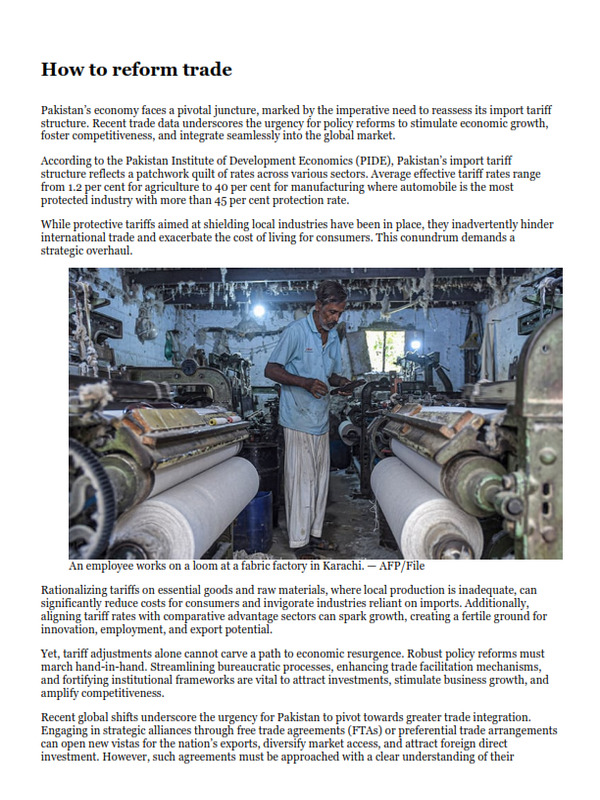How to reform trade
Pakistan’s economy faces a pivotal juncture, marked by the imperative need to reassess its import tariff structure. Recent trade data underscores the urgency for policy reforms to stimulate economic growth, foster competitiveness, and integrate seamlessly into the global market.
According to the Pakistan Institute of Development Economics (PIDE), Pakistan’s import tariff structure reflects a patchwork quilt of rates across various sectors. Average effective tariff rates range from 1.2 per cent for agriculture to 40 per cent for manufacturing where automobile is the most protected industry with more than 45 per cent protection rate.
While protective tariffs aimed at shielding local industries have been in place, they inadvertently hinder international trade and exacerbate the cost of living for consumers. This conundrum demands a strategic overhaul.
Rationalizing tariffs on essential goods and raw materials, where local production is inadequate, can significantly reduce costs for consumers and invigorate industries reliant on imports. Additionally, aligning tariff rates with comparative advantage sectors can spark growth, creating a fertile ground for innovation, employment, and export potential.
Yet, tariff adjustments alone cannot carve a path to economic resurgence. Robust policy reforms must march hand-in-hand. Streamlining bureaucratic processes, enhancing trade facilitation mechanisms, and fortifying institutional frameworks are vital to attract investments, stimulate business growth, and amplify competitiveness.
Recent global shifts underscore the urgency for Pakistan to pivot towards greater trade integration. Engaging in strategic alliances through free trade agreements (FTAs) or preferential trade arrangements can open new vistas for the nation’s exports, diversify market access, and attract foreign direct investment. However, such agreements must be approached with a clear understanding of their implications and calibrated to safeguard national interests.
Crucially, data-driven reforms should be complemented by a comprehensive approach. They will safeguard the vulnerable segments of society through a shift of welfare gains from producers to consumers to ensure equitable outcomes amidst structural changes.
A stable long-run plan will mitigate potential adverse impacts on specific industries and establishing a transition plan are crucial for social cohesion and economic stability.
Furthermore, bipartisanship is key. Building consensus across political divides and fostering collaboration with stakeholders including industry leaders, economists, and civil society ensures a more inclusive and effective policy formulation and implementation process.
In tandem with tariff and policy reforms, embracing technology emerges as a catalyst for progress. Implementing digital solutions across customs procedures, logistics, and supply chain management can significantly reduce transaction costs, eliminate inefficiencies, and bolster trade volumes, propelling Pakistan into a more competitive global arena. PIDE finds that digitalization and elimination of unnecessary documents cut the time cost by around 40-60 per cent.
Nonetheless, the path to reform is riddled with challenges. Addressing entrenched interests, bureaucratic inertia, and navigating resistance to change necessitate unwavering commitment and visionary leadership. However, the potential dividends of a revitalized economic landscape far outweigh these initial hurdles.
Now is the opportune moment for Pakistan to embrace transformative reforms that leverage its strengths, capitalize on global opportunities, and prioritize the welfare of its citizens. The road ahead demands bold and decisive actions towards a more prosperous and inclusive economic future.
However, embarking on these reforms demands a phased and coordinated approach. Here’s a roadmap for the way forward:
Phase-out approach: This is a three-phase scenario. In the first phase, reduce import tariffs on the most protected intermediate industries until their tariff rates reach the average tariff rate (around 12 per cent at present), which will boost producer welfare.
In the second phase, achieve a uniform import tariff rate of 12 per cent by reducing tariffs on all other industries facing higher tariff rates, which will increase consumer welfare.
In the third phase, uniformly reduce tariffs on all industries until we achieve a tariff rate of 5.0 percent. It is believed that the tariff revenues from this approach will be higher due to a higher size of the economy than the current revenues.
Comprehensive policy overhaul: Simultaneously, embark on a comprehensive policy overhaul. Streamline bureaucratic processes, enhance trade facilitation mechanisms, and fortify institutional frameworks to attract investments and amplify competitiveness.
Strategic trade partnerships: Evaluate existing and potential FTAs and preferential trade arrangements. Negotiate agreements that unlock new markets for Pakistani exports while safeguarding vital domestic industries.
Stakeholder engagement: Foster a collaborative environment, bringing together political factions, industry leaders, economists, and civil society. Build consensus for effective policy formulation and implementation.
Technology integration: Embrace technology to revolutionize trade practices. Implement digital solutions to streamline customs procedures, logistics, and supply chain management, reducing costs and inefficiencies.
Pakistan’s journey towards economic revitalization hinges broadly on inclusive tariff reforms. The recent state of trade highlights the urgent need for a recalibration of the import tariff structure and comprehensive policy reforms to steer Pakistan towards sustained economic growth and global competitiveness.
The writer is a research fellow at the Pakistan Institute of Development Economics (PIDE).




